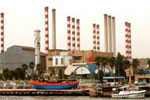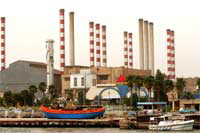 Reuters: Iran’s assertion that it has side-stepped some international sanctions and become self-sufficient in gasoline is political propaganda, experts say, but it could become a reality as early as 2013.
Reuters: Iran’s assertion that it has side-stepped some international sanctions and become self-sufficient in gasoline is political propaganda, experts say, but it could become a reality as early as 2013.
By Emma Farge and Humeyra Pamuk
 LONDON (Reuters) – Iran’s assertion that it has side-stepped some international sanctions and become self-sufficient in gasoline is political propaganda, experts say, but it could become a reality as early as 2013.
LONDON (Reuters) – Iran’s assertion that it has side-stepped some international sanctions and become self-sufficient in gasoline is political propaganda, experts say, but it could become a reality as early as 2013.
U.S.-led sanctions have scared off Iran’s regular gasoline suppliers, hitting what is seen as the Islamic Republic’s Achilles’ heel as lack of refining capacity forces it to import around one-third of its gasoline needs from abroad.
While Tehran is still managing to import fuel from friendly powers since the sanctions over its nuclear programme took full effect in July, it is also fervently pursuing gasoline production through an array of downstream projects.
Several analysts estimate that just two upgrade projects at the existing Abadan and Arak refineries will add 115,000 barrels a day of gasoline-making capacity, allowing Iran to fully plug the deficit sometime between 2011 and 2014.
“We expect Iran to become self-sufficient around 2013 based on the condensate and refining projects they’ve got,” said David Wech of JBC Energy. “They are quite fierce about it,” he said, adding Iran could be a net exporter by 2014.
Oil and gas consultants Facts Global Energy said self-sufficiency could come as early as 2011 or 2012 and that Iran could become a net exporter of gasoline by 2015.
But Iran’s poor track record of finishing such projects on time and the deepening impact of the sanctions across the economy leave some other experts deeply suspicious that Iran can achieve its ambitions.
While refinery upgrades could succeed, analysts said projects to build new plants from scratch are likely to be more difficult and will suffer from considerable delays, or be scrapped entirely.
SLOW SQUEEZE
Apart from the delays, the strain of sanctions on the Iranian economy which restrict its business partners and limit its ability to raise cash and import know-how, would be the major obstacle in developing these projects, experts say.
“We discount them making any real progress on refineries over several years,” said Jamie Webster, senior consultant, at global energy advisors PFC Energy.
“These were designed to be long-lasting sanctions, slowly squeezing their economy … We think it’ll be extremely difficult not just in terms getting material into the country, and the real pinch has been the inability to get trade finance,” he said.
Many international companies operating in a wide range of industries have stopped doing business with the Iran since the U.N. Security Council passed sanctions in June.
The U.S. Congress has followed up with additional measures penalising Iran’s energy and banking sector and has gone after foreign companies that do business with Tehran.
Iran, which has resisted pressure to open wide-ranging talks over its atomic ambitions, says that its nuclear programme is entirely peaceful and only aimed at supplying electricity to domestic users so it can export more of its oil and gas.
“U.S. and EU sanctions have certainly made financial transactions and material supplies more difficult, thus making it more likely that their refinery expansion plans for 2011/12 will be delayed,” said Saket Vemprala of research group Business Monitor International, adding that boosting output at existing refineries will be easier.
SURVIVAL TACTICS
While working on gasoline self-sufficiency, Iran is also pulling out all the stops to secure the fuel it needs and avoid a sudden price rise at the pump.
Previous price hikes have sparked riots in Iran where many regard subsidised gasoline prices as low as 10 U.S. cents a litre as their birthright. Tensions could rise anyway as Tehran phases-out its $100 billion subsidies for the fuel.
“Regardless of the big bite the sanctions are taking out of the Iranian economy, Iran will likely take the punishment and pain and continue on its present course,” said Fawaz Gerges, Middle East politics professor at the London School of Economics.
“There are enough markets, and not just black markets, to allow them to survive.”
Traders say unofficial cargoes have been flowing to Iran from Iraq and Pakistan, and also cite shipments from China, which has signed up to U.N. sanctions but refused to support measures that target Iran’s oil and gas sector.
Iran, the world’s fifth-largest crude exporter, has also diverted its petrochemical units to produce gasoline and through this, officials announced, it has managed to achieve self-sufficiency and even export its first gasoline cargo.
Both statements have failed to convince the market.
“Propaganda looks to be a quite likely reason for the stories from last week,” said Samuel Cizsuk, senior energy analyst at IHS. “They might as well be selling to themselves, otherwise, going from a huge deficit to suddenly exporting 1-2 cargoes doesn’t make sense, especially if you’re not producing gasoline in an economical way.”
A tiny 9,900-tonne gasoline cargo was shipped from Bandar Mahshahr in early August — about one-third of a normal vessel — but sources said the fuel was likely poor quality termed “Iraq grade” as it can only meet the specifications of Iran’s war-torn neighbour.
A gasoline trader at a company formerly supplying Iran speaking on condition of anonymity said: “They are trying to launch a war of nerves. What they call gasoline is probably something else.”
(Editing by Jon Hemming)


